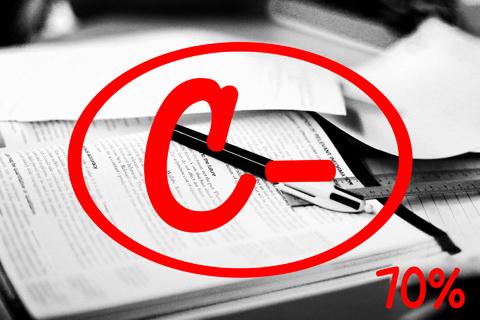Washburn teacher gives students advice on grades
December 19, 2013
I’ve been teaching at Washburn since the fall of 2003. In that time, I have heard a lot of stories and encountered my fair share of student emotion. Most faculty would agree that we want students to succeed. We want them to reach their goals and leave Washburn to make a positive impact on our world.
We know that all students will encounter a variety of obstacles on their educational journeys. Some students might even be experiencing some of those obstacles now as they check their grades and wonder how in the world they will answer the family members who inevitably have a lot of questions about how the semester went.
First of all, realize that no matter what grade was recorded, it is not the end of the world. And, you are not alone. You are not the first nor will you be the last to receive whatever grade was recorded.
Consider the review of your grades a learning opportunity. Many of you will be able to celebrate your successes and perhaps experience relief at a close call. Still others will experience some mixed results. Your missed attempts might lead you to ask yourself some revealing questions. Was it a challenging subject matter? Did you attend class and complete assignments? Were you truly giving the class the appropriate attention? Are there steps you can take to succeed in the future?
And, some of you might even experience some more serious and painful circumstances as you login to mywashburn.edu to check those grades. While it can put a damper on your holiday cheer, keep in mind that you have options.
You should know that grades of D or F come with the option to retake the course and replace the grade. It will still reflect on your transcript, but it will improve your grade point average. When you are a freshmen or sophomore, Ds and Fs have bigger impacts on your GPA because you lack the credit hours needed to balance. Academic probation can be a consequence, but it can also help you focus on the many campus resources available to students trying to succeed in college.
If you found yourself dealing with a tough life circumstance this semester, you might find other options available to you. Medical withdrawals are available for students who maybe had a major health issue personally or perhaps an unexpected trauma was experienced by a family member.
When it comes to answering those questions from your family, Marilynn Koelliker, director of counseling at Washburn, recommends just telling the truth. She says students should also plan to offer action steps about how you plan to regroup for the future.
Psychology professor Cindy Turk reminds students that not all “how was your semester?” questions carry the same weight. If your parents are helping you through school and ask, you might take Koelliker’s advice and talk it out with them. But, if it’s just your neighbor from home or a casual acquaintance, there is no need to launch into the full story. A simple, polite response will do. You might respond, “I’m glad it’s over and I am excited for the break” or just give them a quick “fine” and be on your way.
Both Turk and Koelliker encourage students to remember that your value is not tied to your performance in school. And, I would add that you should treat yourself how you would treat a close friend who faced similar circumstances.
One of my best friends ironically offers this advice when things don’t work out as well as you’d like: “Give the past a C minus and move on.”



